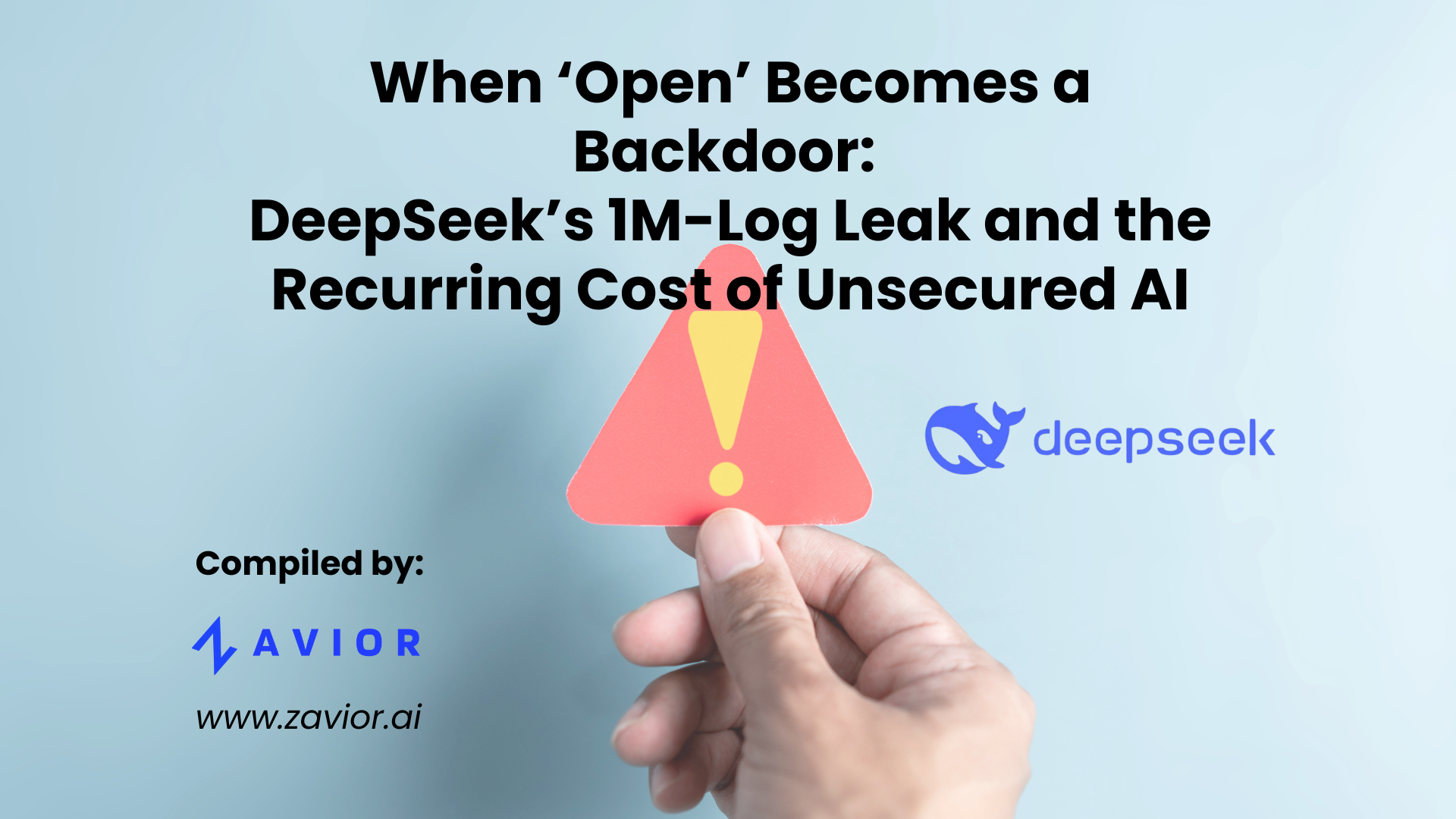DeepSeek, a chinese AI startup, has ignited global tech sector turbulence by launching cost-efficient models rivaling industry leaders like OpenAI at a fraction of the development cost.
Hence why, when news of a recent data breach at DeepSeek has the ability to catch fire. Wiz's Research Team has exposed critical vulnerabilities in AI infrastructure security while highlighting the importance of ethical cybersecurity practices. Cloud security startup Wiz (https://www.wiz.io/) identified an unprotected ClickHouse database containing over 1 million log entries with chat histories, API keys, and operational details [1]. While the incident raises alarms about AI security, it also demonstrates how responsible disclosure processes can mitigate damage.
Do check out their original blog (linked) to find out more on how they found the vulnerability. What we wanted to cover here is their ethical approach setting an industry standard amongst all cyber practitioners and business owners.
Wiz's Ethical Approach Sets Standard
Wiz Research exemplified industry best practices by:
- Immediately alerting DeepSeek upon discovery
- Limiting investigation to non-intrusive enumeration
- Refraining from accessing proprietary files/passwords
- Publishing detailed technical findings post-resolution
This responsible disclosure enabled DeepSeek to secure the database within an hour of notification, preventing potential mass data exploitation. Wiz's transparency provides a blueprint for balancing security research with corporate accountability.Open Port Vulnerabilities: Recurring Threat in SingaporeThe DeepSeek breach mirrors systemic infrastructure security failures globally, particularly regarding open ports. Here is some related incidence that happened in Singapore to demonstrate this pattern:
SingTel Routers (2021) - Singapore national internet service provider (ISP)
- Issue: Like DeepSeek’s unprotected ClickHouse database, SingTel’s port 10000 was left open after troubleshooting due to human oversight. Both incidents involved temporary access for operational purposes that became permanent exposures.
- Consequences: 1,000+ routers & IoT devices exposed
- Link: https://www.scworld.com/news/open-ports-left-over-1000-singtel-routers-vulnerable-to-cyber-attacks
HMI Institute of Health Sciences (2019) - Healthcare training provider
- Issue: The 4-year exposure of RDP port 3389 mirrors DeepSeek’s lack of continuous monitoring. Both allowed brute-force attacks via default/open ports.
- Consequences: A Ransomware encrypted 600k health records and they were fined $35,000 by the Personal Data Protection Commission (PDPC) in 2021
- Link: https://www.straitstimes.com/tech/tech-news/singapore-firms-fined-75000-for-personal-data-lapses-affecting-over-600000-people
Crawfort (2020) - Licensed money lender in Singapore
- Issue: Crawfort’s AWS S3 port was opened during COVID-19 migration, akin to DeepSeek’s possible infrastructure scaling. Both prioritized business continuity over security.
- Consequences: The misconfiguration of open ports led to direct data leaks (5,421 financial records at Crawfort vs. sensitive AI logs at DeepSeek). Neither enforced access controls or encryption during transient phases.
- Link: https://www.pdpc.gov.sg/-/media/Files/PDPC/PDF-Files/Commissions-Decisions/Decision---Crawfort-Pte-Ltd---070622.pdf
These cases exemplify the "forgotten port" syndrome—temporary configurations becoming permanent vulnerabilities due to:
- Lack of automated rollback protocols
- Absence of real-time network monitoring
- Over-reliance on manual processes in critical infrastructure
The Singapore examples contextualize DeepSeek’s breach as part of a global pattern of preventable misconfigurations, validating Wiz Research’s warning about systemic AI infrastructure risks. What can businesses in Singapore & Southeast Asia do about this? As AI and digital transformation reshape industries across Asia, Singapore's SMEs find themselves at a critical juncture. The DeepSeek breach serves as a stark reminder that even cutting-edge tech companies can fall victim to basic security oversights. For local business owners, this isn't just a cautionary tale—it's a call to action.
Navigating the AI Security Landscape
You don't need to be an AI startup to face similar risks. As your business adopts more digital tools and cloud services, the attack surface expands. The good news? You're not alone in this journey.Building Your Cybersecurity Team
- Local Talent: Singapore's universities and polytechnics are producing skilled cybersecurity graduates. Consider internship programs to nurture homegrown talent. Many who are in career transition are looking towards Cyber Security as a skill to pick up.
- Upskilling: Invest in training for your existing staff, especially your lonely IT staffs. Many local institutions offer cybersecurity certifications tailored for working professionals.
- Diversity: Look beyond traditional tech backgrounds. Finance professionals, for instance, often have valuable risk management skills applicable to cybersecurity.
Finding the Right Partners
While building in-house capabilities is crucial, partnering with cybersecurity experts can provide immediate protection and long-term guidance. Companies like ours www.zavior.ai specialize in helping SMEs navigate the complex world of AI and cybersecurity. We can help by:
- Bridging the knowledge gap, through articles such as this
- Find you the right Cyber Security consultants from our existing partners who can help you conduct security audits tailored to your specific business needs
- Connect you with the right Solution / Software that can strengthen your digital domain.
- Automate and help you stay compliant with evolving data protection regulations
Remember, cybersecurity isn't just about preventing breaches—it's about building trust with your customers and partners. In today's digital economy, robust security practices are a competitive advantage.Don't wait for a DeepSeek-style incident to jolt your business into action. Start the conversation about AI security in your organization today. Whether you're just beginning your digital transformation journey or looking to secure existing systems, there's never been a better time to invest in your company's digital resilience.
About DeepSeek, founded in 2023 by serial entrepreneur Liang Weneng, the company’s DeepSeek-R1 reasoning model and Janus-Pro-7B image generator reportedly match OpenAI’s o1 in performance despite costing under $6 million to train—a stark contrast to the multibillion-dollar budgets of U.S. competitors. This breakthrough, leveraging architectural innovations like Mixture-of-Experts (MoE) and reinforcement learning, challenges the “bigger is better” paradigm in AI development while exposing inflated market valuations of firms like Nvidia, which lost $600 billion in market cap post-announcement. Combined with its open-source strategy and alignment with China’s state-backed AI ambitions, DeepSeek’s rise signals a seismic shift in global AI dynamics, prompting debates about sustainability, accessibility, and geopolitical tech dominance.


.png)
%20(1).png)

